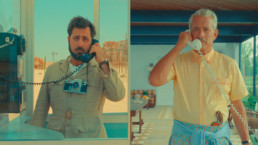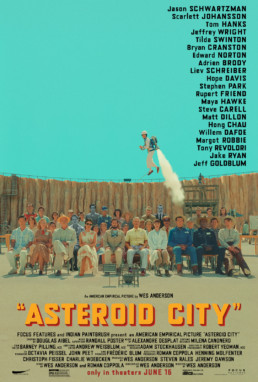Asteroid City
Wes Anderson's most spiritual film to date, 'Asteroid City' acts as a cosmic meditation on life outside of our atmosphere.
Wes Anderson’s latest film, Asteroid City, may be missing the auteur’s most repeatedly cast actor–Bill Murray–but his absence doesn’t leave too big a dent in this otherwise riotous affair. Jason Schwartzman–and to some degree, Bryan Cranston–anchor this meta-tale of a science field trip gone wrong and the controlled chaos that occurs after a small town’s unexpected meet-and-greet takes place with an extraterrestrial.
Wes’s quintessential quirks and styling shine in this dry desert landscape. Combined with the film’s use of a once-again perfectly-curated soundtrack, Asteroid City is one of Anderson’s more commercially accessible feature films.
Asteroid City is a nostalgic take on America’s nuclear-era obsession with aliens. Set in 1955, the town of Asteroid City (population: 87) is set to hold a convention for families to congregate and celebrate their children being named Junior Stargazers. Augie Steenbeck (Schwartzman) arrives with his son Woodrow (Jake Ryan) and three daughters and quickly meets the other families attending the literal star-studded affair.
Midge Campbell (Scarlett Johansson), her daughter Dinah (Grace Edwards), and three other Space Cadet award winners and their families are also amongst the group. Their cumulative IQ is highly concentrated in this remote city, but despite being some of the smartest people in the American Southwest, no one could have guessed that what they were about to collectively witness would change their lives forever.
Of course, this being a Wes Anderson film, there is more to the story than this surface-level synopsis. The unexpected narrative choices and plot delivery throughout the film allow the audience to go inward and explore the themes that resonate with them personally. Watching the movie and mining for themes myself–both subtle and loud & clear–it is obvious to me how Anderson intentionally creates scenes with characters that have juxtaposing outlooks on love and loneliness, grief and hope, and life and death. Pick your fighter; I’m Jeff Goldblum.

It should come as no surprise to hear that the acting is superb. As mentioned earlier, Bill Murray is missing from the typical all-star lineup, but like a classic SNL skit, nearly all returning cast members are represented (even if it’s just for a cameo). That includes Edward Norton, Jeffrey Wright, Tilda Swinton, Adrien Brody, and Tony Revolori. While not meaty enough for any one person to be a frontrunner in the awards conversation, as an ensemble, the synergy fits like a glove.
The deadpan dialogue between the characters is delightfully funny but the real humor comes from what isn’t said. A subtle look, a lack of acknowledgment, a simple sign indicating that road construction has stopped indefinitely. In addition to expectedly brilliant soundtrack curation by music supervisor Randall Poster, Alexandre Desplat’s score, and costumes by Milena Canonero, special attention should be paid to the puppeteers, specifically Andy Gent (please stay through the credits to see why he deserved a shoutout).
The most spiritual in his film canon to date, Wes Anderson pokes the philosophical bear by creating Asteroid City to play as a cosmic meditation on life outside of our atmosphere. How people react to the unfamiliar–like being quarantined in a new city, adapting to the death of a loved one, or even the invention of new technology–is explored here.
One of the lines that have stuck with me, and that is a good barometer read of the film’s intention, states, “You can’t wake up if you don’t fall asleep.” Interpret it as you will, but it’s no doubt Asteroid City will take you on an explorative journey of how we embrace “the other.”
104 minutes. Distributed by Focus Features. Exclusive engagements in NY and LA on June 16, and in theaters everywhere on June 23.
Morgan Rojas
Certified fresh. For disclosure purposes, Morgan currently runs PR at PRETTYBIRD and Ventureland.


